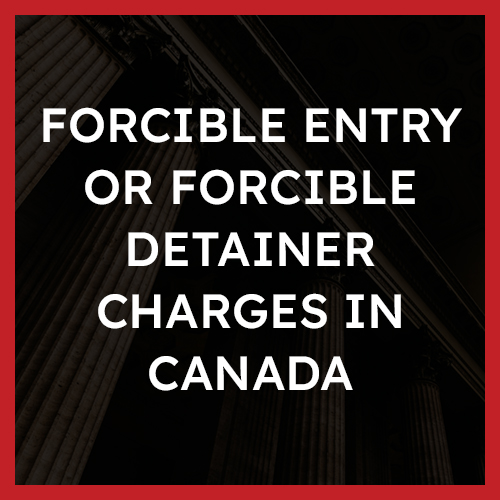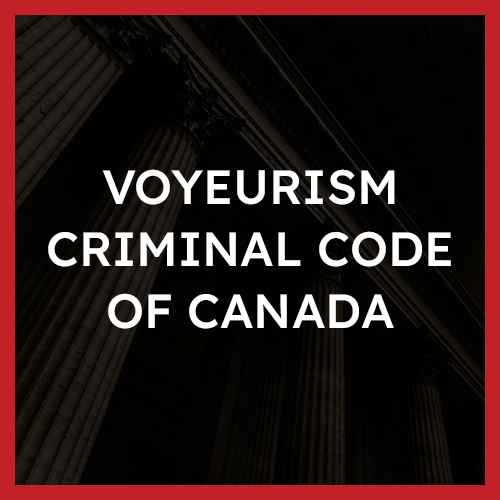Forcible Entry or Forcible Detainer Laws in Canada

A forcible entry charge occurs when a person enters property that is possessed by another person, in a manner that is likely to cause a breach of the peace or a reasonable apprehension of a breach of the peace. This requires some violence or threat of violence and the presence of someone who might resist the interference.
A forcible detainer charge occurs when a person detains another person’s property without an honest belief or mistake regarding who owns the property. The detention of the property must be done in a manner that is likely to cause a breach of the peace or a reasonable apprehension of the breach of the peace against the property’s rightful owner.
Forcible entry and forcible detainer are hybrid offences with a Crown election. This means that depending on the circumstances of your case the Crown can elect to proceed by indictment or summarily. If an accused is prosecuted by indictment, there is a Defence election of court under s. 536(2) of the Criminal Code.
Examples
Some examples of forcible entry and forcible detainer charges may include the following:
- Forcefully entering a person’s home violently or with the threat of violence;
- Forcefully entering someone’s car while they are trying to prevent you from entering;
- A tenant changing the locks on their landlord’s property to prevent the landlord from accessing it; and
- Occupying a piece of land or a building without permission of the lawful owner.
Defences
The defences available to forcible entry and forcible detainer charges are entirely dependent on the facts of your case.
However, some defences to a forcible entry or forcible detainer charge may include:
- The accused was wrongly identified as the person who forcibly entered or detained someone’s property;
- There was no violence or threat of violence;
- The property that was forcibly detained was not “real property”; and
- The accused held the honest belief that they were legally allowed to possess the property they detained.
Punishment
A forcible entry or forcible detainer charge is a hybrid offence, which entails a maximum punishment as follows:
- Imprisonment for a term not exceeding 2 years.
Punishments for forcible entry or forcible detainer depend on if the Crown elects to pursue the charge as an indictable offence or summarily. There are no mandatory minimum penalties for this offence. The maximum is no more than 2 years of incarceration if prosecuted by indictment. If prosecuted summarily, the maximum punishment is no more than 6 months of incarceration and/or a $5,000 fine.
A forcible entry or forcible detainer charge can also entail severe consequences for current and future employment opportunities and immigration status.
Overview of the Offence
According to s. 72 of the Criminal Code:
Forcible entry
72(1) A person commits forcible entry when that person enters real property that is in the actual and peaceable possession of another in a manner that is likely to cause a breach of the peace or reasonable apprehension of a breach of the peace.
Matters not material
(1.1) For the purposes of subsection (1) [forcible entry – offence], it is immaterial whether or not a person is entitled to enter the real property or whether or not that person has any intention of taking possession of the real property.
Forcible Detainer
(2) A person commits forcible detainer when, being in actual possession of real property without colour of right, he detains it in a manner that is likely to cause a breach of the peace or reasonable apprehension of a breach of the peace, against a person who is entitled by law to possession of it.
Questions of law
(3) The questions whether a person is in actual and peaceable possession or is in actual possession without colour of right are questions of law.
According to s. 73 of the Criminal Code:
Punishment
73 Every person who commits forcible entry or forcible detainer is guilty of
- An indictable offence and liable to imprisonment for a term of not more than two years; or
- An offence punishable on summary conviction.
The Guilty Act (Actus Reus)
The actus reus for a forcible entry or forcible detainer charge under s. 72 is established by proof, beyond a reasonable doubt, of the following:
Forcible Entry
- The accused at a specified date and time, in the correct jurisdiction, unlawfully enters someone else’s property by force without permission;
- The entry involved some violence or threat of violence; and
- The accused entered in a manner likely to cause a breach of the peace or reasonable apprehension of a breach of the peace.
Forcible Detainer
- The accused is in actual possession of someone else’s property without lawful authority or right;
- The property is real property; and
- The accused’s possession of the real property is in a manner likely to cause a breach of the peace or reasonable apprehension of such a breach.
R v Czegledi held that the offence requires “some violence, or threatened violence, upon someone in occupation, and who might resist.”
In R v D(J) the court states that for the charge to be made out, the breach of peace must “flow from the manner in which possession of the real property is taken and not from subsequent events.” For example, if someone forcefully enters a property and unlawfully detains it, causing a disturbance or confrontation with the rightful owner or occupants at the time of entry, that would be considered a breach of the peace flowing from the manner in which possession was taken.
The Guilty Mind (Mens Rea)
The mens rea for a forcible entry or forcible detainer charge under s. 72 include proving, beyond a reasonable doubt, that:
Forcible Entry
- The accused intended to enter real property that is in the actual and peaceable possession of another; and
- The accused knew or ought to have known that entry was likely to cause a breach of the peace or reasonable apprehension of a breach of the peace.
Forcible Detainer
- The accused knowingly detained real property without colour of right; and
- The accused knew or ought to have known that entry was likely to cause a breach of the peace or reasonable apprehension of a breach of the peace.
Defences
How to Beat a Forcible Entry or Forcible Detainer Charge
Every case is different. The availability and strength of any defence depend entirely on the specific facts of your case. The strength of any available defence rests on the evidence against you and the precise details of the allegations. However, the following are some common defences that may be used when fighting a forcible entry or forcible detainer charge:
Factual innocence
A strong defence against a forcible entry or forcible detainer charge is to maintain that you are factually innocent. If you can show that the facts and the evidence do not support that you did not forcibly enter or forcibly detain another’s lawful property, then you may have a defence that you were factually innocent.
Colour of Right
This defence refers to a genuine belief that one has a legal entitlement or right to possess the property in question. This defence hinges on the sincerity of the belief and whether it is objectively reasonable under the circumstances. If the accused genuinely but mistakenly believes they have a lawful right to possess the property, this defence may shield them from conviction for a forcible detainer charge.
Identity
Depending on the circumstances of your case, a possible defence to a forcible entry or forcible detainer charge may be to raise an identity defence. In this case, for this defence to be raised successfully, you will have to prove that you were not the person who forcibly entered or forcibly detained someone’s property.
Any applicable Charter defences
The Charter sets out your rights and freedoms before and after your arrest. If the police fail to abide by these rights deliberately or inadvertently, it could aid in your defence. If any of your Charter rights have been violated before or after your arrest, you may be able to have some or all of the evidence that the Crown is relying on to secure a conviction excluded under s. 24(2) of the Charter.
Punishments
The Criminal Code provides for a possible maximum term of imprisonment of no more than 2 years for those convicted of forcible entry or forcible detainer.
Persons found guilty of forcible entry or forcible detainer are eligible for sentencing entailing a discharge, suspended sentence, stand-alone fine, custody, custody with a fine or probation or a conditional sentence order.
Frequently Asked Questions
Can you go to jail for forcible entry or forcible detainer?
Yes, individuals can face imprisonment for committing forcible entry or forcible detainer. Section 73 of the Criminal Code stipulates that those found guilty of either offence can be subject to imprisonment for a term of up to two years. The severity of the punishment may vary depending on the circumstances of the case and whether the offence is prosecuted as an indictable offence or on summary conviction.
What is the maximum penalty for forcible entry or forcible detainer?
The maximum penalty for forcible entry or forcible detainer in Canada is outlined in section 73 of the Criminal Code. Individuals convicted of either offence can face imprisonment for a term of up to two years. It’s important to note that the severity of the punishment may vary depending on factors such as the specific circumstances of the case and the discretion of the court.
Is forcible entry or forcible detainer an indictable offence?
Forcible entry or forcible detainer is considered a hybrid offence, meaning it can be prosecuted either summarily or by indictment. Section 73 of the Criminal Code stipulates that individuals found guilty of these offences can face imprisonment for a term of up to two years. The decision on how to proceed with prosecution typically depends on factors such as the seriousness of the offence, the circumstances of the case, and the discretion of the prosecutor. Therefore, the prosecution may choose to proceed summarily or by indictment based on these considerations. It’s crucial to understand that regardless of the mode of prosecution, forcible entry or forcible detainer is a serious offence with potential legal consequences, including imprisonment.
Published Decisions
R v DJ, 2002 CanLII 16805 (ONCA)
The appellant was charged with break and enter, assault, and forcible entry. The incident unfolded with the appellant being pursued by police officers after a report of a break-in at a residence. The officers, along with a police dog, tracked the appellant to a nearby park where they observed him matching the description of the intruder provided by the victim. The appellant, upon seeing the officers, quickly walked away and proceeded to the front door of another residence nearby, which belonged to Ms. Violet Bernard. Mark, Ms. Bernard’s twelve-year-old son, recognized the appellant as an acquaintance and let him into the house when the appellant said, “Pretend I live here.” The appellant then attempted to leave through the back door but found it blocked by furniture. After observing a police officer waiting outside, the appellant went upstairs.
During the trial, the issue centred around whether the appellant’s actions constituted forcible entry as defined by the Criminal Code. The trial judge concluded that the appellant’s entry into Ms. Bernard’s residence, coupled with the circumstances surrounding it, constituted forcible entry under the law. However, on appeal, the Court of Appeal disagreed, finding that the evidence presented did not support a conviction for forcible entry as the breach of the peace did not directly result from the manner in which the appellant entered the property. Consequently, the Court allowed the appeal, set aside the conviction for forcible entry, and entered an acquittal for that charge.
You can read the full decision here.
R v Czegledi, 1931 CanLII 246 (SKCA)
In this case, the appellant was appealing a conviction for forcible entry. The incident involved the accused and his wife, who were the owners of a property where the house in question was located. They had entered into an agreement with Sinclair, selling him their equity in the house as part payment for a half section of land. However, at the time of the incident, Sinclair had not yet taken possession of the house, and it was vacant.
The accused, on the night of September 14, forced the lock on the back door of the house, entered, and took possession of it with his family. The appellant’s argument centred on the interpretation of “forcible entry” under section 72 of the Criminal Code, which defines it as an entry in a manner likely to cause a breach of the peace on land than in actual and peaceable possession of another.
The court ultimately concluded that an entry by breaking a lock of vacant premises, where there was no one present at the time, did not constitute forcible entry under section 72 of the Criminal Code. The court reasoned that such an entry was not likely to cause a breach of the peace or a reasonable apprehension thereof. Therefore, the conviction for forcible entry was quashed, and the appeal was allowed.
You can read the full decision here.
R v Wilson, 2000 BCSC 1401
The appellant appealed his conviction of forcible entry on real property. The facts of the case were not in dispute. On March 19, 2000, Trevor Stewart was sleeping in his residence at 3844 Ophir Street, Saanich, B.C., with his wife and child. Around 1:00 A.M. on March 20, 2000, Stewart awoke to a strange noise and found Wilson crouching down at the end of the couch. Stewart apprehended Wilson and held him until the police arrived.
The court concluded that Wilson committed forcible entry because he entered the residence in a manner likely to cause a breach of the peace. While there was no evidence of violence, Wilson’s presence in the residence, viewed objectively, was likely to cause a breach of the peace or reasonable apprehension thereof. The court also found that Wilson intended to deprive Stewart of possession of his residence.
You can read the full decision here.
Contact Us
If you have been charged with a criminal offence, visit our location pages to contact our team.
About The Author
Ask A Question
We endeavor to respond to questions within 24 hours. If your matter is urgent, please call our office or submit a request for a free consultation.







